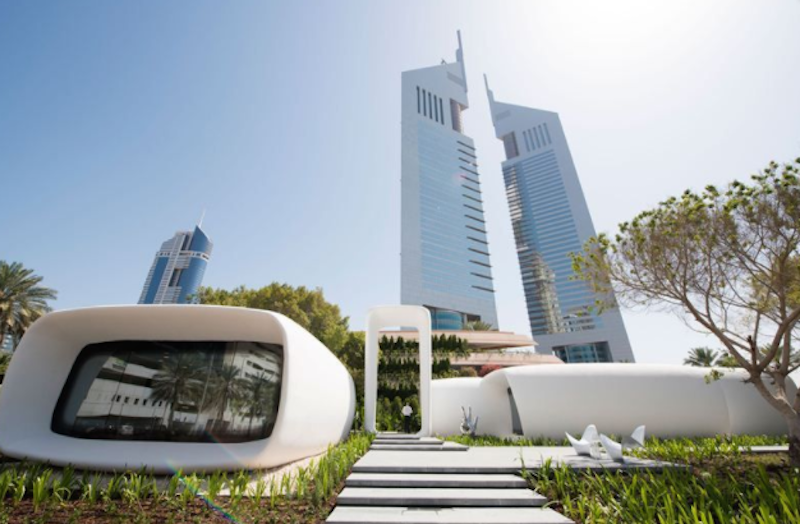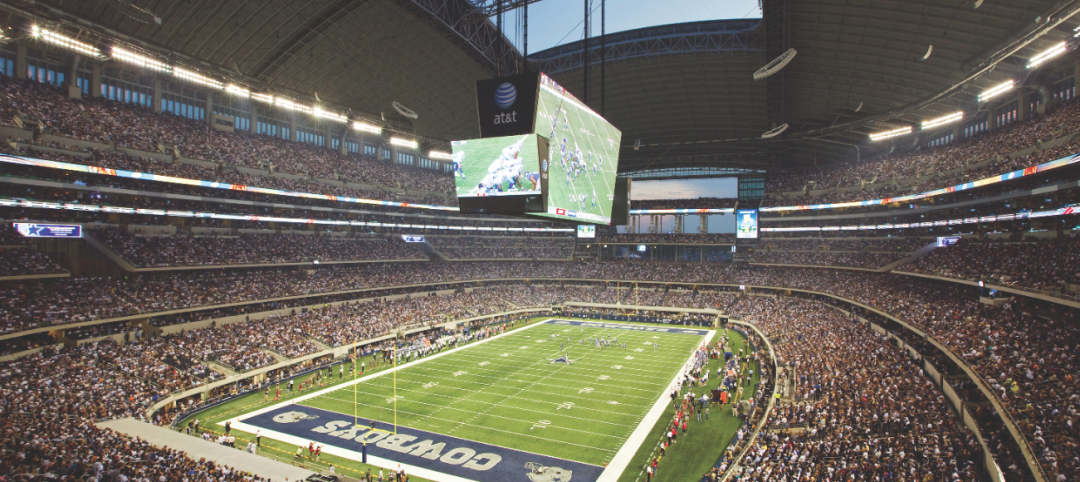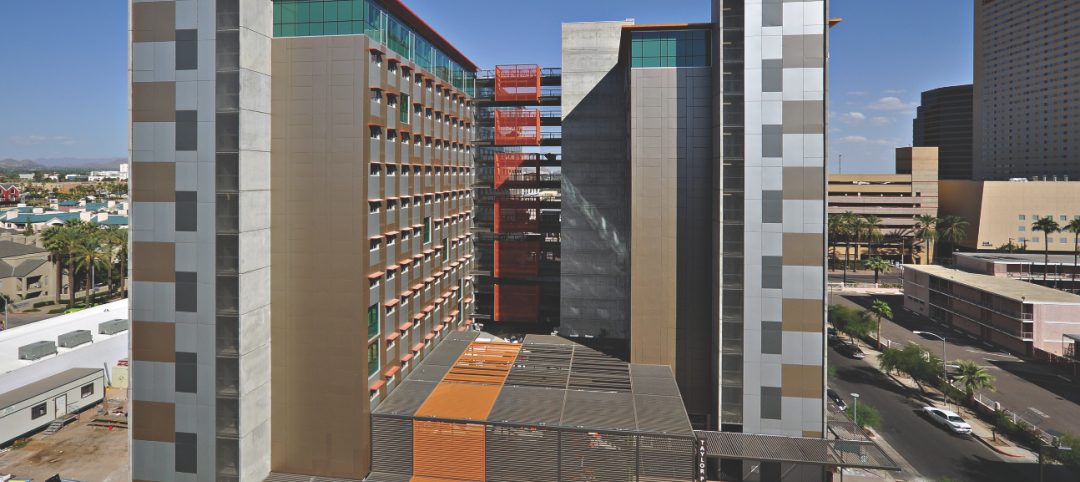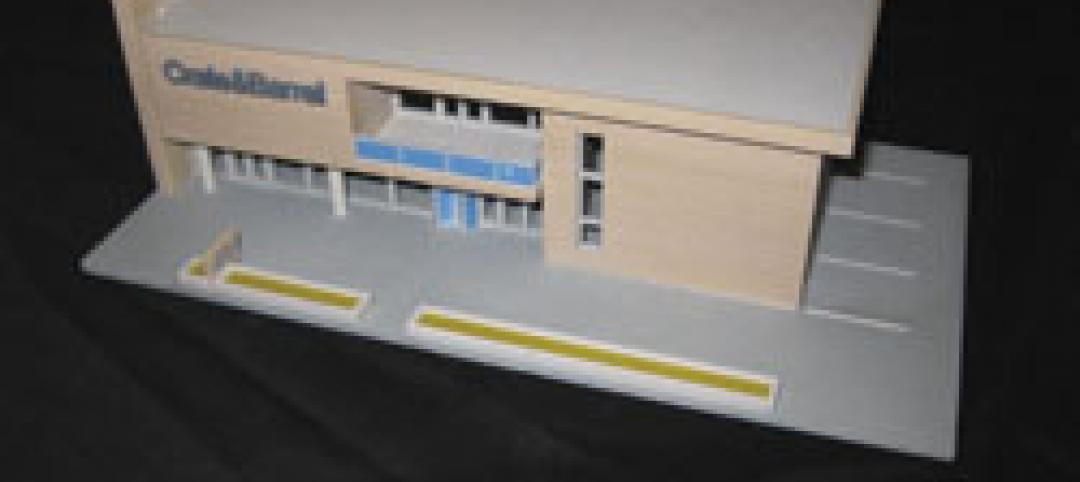Last April, Dubai unveiled its 3D Printing Strategy, which calls for 25% of buildings in that city to be constructed using 3D printing technology by 2030. That strategy focuses on three major sectors: construction, medical products, and consumer products. The use of 3D printing in Dubai’s construction sector will increase by 2% starting in 2019.
One month after the strategy was publicized, Dubai completed what it asserts is the world’s first 3D-printed office, a 250-sm (2,691-sf) building made from a mixture of cement and other building materials, and assembled in 17 days by a 3D printer measuring 20 feet high, 120 feet long, and 40 feet wide, with a automated robotic arm.
Can a 3D-printed city be too far behind? The answer might lie in the Minitank, a 3D-printing crane under construction that its developer, a Silicon Valley startup called Cazza Construction Technologies, says can layer 2,153 sf of concrete per day, which would make it 50% faster than conventional construction methods.
Cazza’s 19-year-old CEO and co-founder Chris Kelsey tells CNN that construction is the natural progression for 3D printing. Last year, the Dubai Road and Transport Authority invited Cazza to present its technology to government officials overseeing the 3D Printing Strategy initiative. “Out of all of the groups they’d seen online or spoken with, they were most fascinated with the capabilities of our unique machines,” Kelsey told ConstructionWeekOnline.com.
It remains to be seen, though, whether this technology is practical for large-scale projects. There’s not much information about Cazza’s origins or its technology on its website, nor any images of the Minitank. (The site, however, is opening soliciting for partners and distributors for its technology.) Previously, Kelsey founded a company called Appsitude, an app development company. Part of Cazza’s funding came from proceeds of Appsitude’s sale last year.
Cazza, though, is undeniably following in the footsteps of pioneers who have tested the limits of 3D printing for construction. These include Behrokh Khoshnevis, a professor at the University of Southern California, who invented a concrete-extruding 3D printer in 2009 that could print a 2,500-sf structure in 20 hours; the construction firm WinSun, which in 2014 3D printed 10 one-story houses in a single day; and DUS Architects, which last year 3D printed a full canal house in Amsterdam.
Cazza’s process is relatively straightforward: an architect would upload blueprints onto a computer system, which transmits the information to the crane printer that layers the concrete in the shape of the design.
The Minitank, if it becomes operational, will be able to print on-site, and construct buildings up to three stories high. “The barrier to companies [printing on-site] so far has been that it’s extremely difficult to develop a machine with all of the factors needed,” Kelsey explained.
The Minitank would use cement made from 80% recycled materials. Cazza claims that its portable equipment can be set up within 30 minutes, and that its process would reduce labor and materials costs by up to 90%. Fernando De Los Rios, Cazza’s COO, said his company would soon bring its engineers from across the world to start working in Dubai and surrounding areas.
Dubai’s Roads and Transport Authority has several 3D printed projects in the works already, including the Museum of the Future, and DEWA’s labs in the Mohammed Bin Rashid Al-Maktoum Solar Park.
Related Stories
| Sep 13, 2010
World's busiest land port also to be its greenest
A larger, more efficient, and supergreen border crossing facility is planned for the San Ysidro (Calif.) Port of Entry to better handle the more than 100,000 people who cross the U.S.-Mexico border there each day.
| Sep 13, 2010
Triple-LEED for Engineering Firm's HQ
With more than 250 LEED projects in the works, Enermodal Engineering is Canada's most prolific green building consulting firm. In 2007, with the firm outgrowing its home office in Kitchener, Ont., the decision was made go all out with a new green building. The goal: triple Platinum for New Construction, Commercial Interiors, and Existing Buildings: O&M.
| Sep 13, 2010
Stadium Scores Big with Cowboys' Fans
Jerry Jones, controversial billionaire owner of the Dallas Cowboys, wanted the team's new stadium in Arlington, Texas, to really amp up the fan experience. The organization spent $1.2 billion building a massive three-million-sf arena that seats 80,000 (with room for another 20,000) and has more than 300 private suites, some at field level-a first for an NFL stadium.
| Sep 13, 2010
'A Model for the Entire Industry'
How a university and its Building Team forged a relationship with 'the toughest building authority in the country' to bring a replacement hospital in early and under budget.
| Sep 13, 2010
Committed to the Core
How a forward-looking city government, a growth-minded university, a developer with vision, and a determined Building Team are breathing life into downtown Phoenix.
| Sep 13, 2010
3D Prototyping Goes Low-cost
Today’s less costly 3D color printers are attracting the attention of AEC firms looking to rapidly prototype designs and communicate design intent to clients.
| Aug 11, 2010
Mark McCracken named chair-elect of USGBC Board of Directors
Mark MacCracken, CEO of CALMAC, Inc., a producer of cold storage energy solutions, has been selected as Chair-elect of the U.S. Green Building Council (USGBC) Board of Directors for the 2010 calendar year. The USGBC Board of Directors is responsible for articulating and upholding the vision, values and mission of USGBC. In 2009, MacCracken was elected to serve a second 3-year term as Director in the Energy Services Seat.
| Aug 11, 2010
Underwriters Laboratories, ICC Evaluation Service announce dual evaluation and certification program for building products
Underwriters Laboratories (UL), the leading product safety testing organization, and ICC Evaluation Service, Inc (ICC-ES), the United States' leader in evaluating building products for compliance with code, today announced a partnership that will provide the building materials industry with a Dual Evaluation and Certification Program for building products.
| Aug 11, 2010
The New Yorker's David Owen: Why Manhattan is America's greenest community
David Owen is a staff writer at The New Yorker and the author of 14 books, most recently Green Metropolis: Why Living Smaller, Living Closer, and Driving Less Are the Keys to Sustainability, in which he argues that Manhattan is the greenest community in America. He graduated from Harvard and lives in Washington, Conn., where he chairs the town planning commission.













